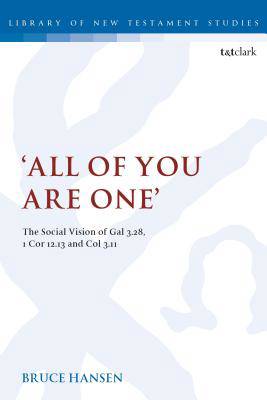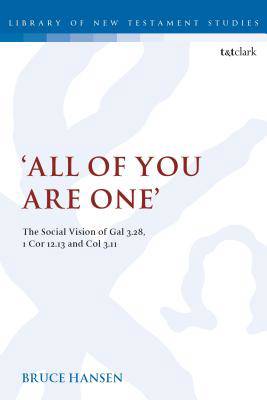
- Afhalen na 1 uur in een winkel met voorraad
- Gratis thuislevering in België vanaf € 30
- Ruim aanbod met 7 miljoen producten
- Afhalen na 1 uur in een winkel met voorraad
- Gratis thuislevering in België vanaf € 30
- Ruim aanbod met 7 miljoen producten
Zoeken
€ 79,95
+ 159 punten
Uitvoering
Omschrijving
Hansen argues against prevalent views that the unity formula employed in Gal 3.28, 1 Cor 12.13 and Col 3.11 reflects either a Hellenistic anthropology of ideal androgyny or a modern liberal conception of social equality.
Rather, Hansen contends, attention to function and context demonstrates each epistle's vision of social unity. Insights from ethnic theory elucidate how epistles characterize this unity in terms of a new social identity, and the practices warranted by that identity. Furthermore, Hansen claims that because identity construction is continual, dynamic and discursive, alternate identities (e.g. ethnic, gender, religious, economic) within the new Christian communities, may be seen as influencing one another and may be termed as the collective Christian identity.
Hansen employs theories from Ethnic study as tools for assessing how such overlapping identities persist and interact with one another. His analysis thereby demonstrates that the social unity promoted by this formula opposes cultural dominance by any particular group and, conversely reinforces the persistence of marginal social identities within new communities. The issue is then not one of gender equality, but of the equality that Paul wishes to develop between competing social groups.
Rather, Hansen contends, attention to function and context demonstrates each epistle's vision of social unity. Insights from ethnic theory elucidate how epistles characterize this unity in terms of a new social identity, and the practices warranted by that identity. Furthermore, Hansen claims that because identity construction is continual, dynamic and discursive, alternate identities (e.g. ethnic, gender, religious, economic) within the new Christian communities, may be seen as influencing one another and may be termed as the collective Christian identity.
Hansen employs theories from Ethnic study as tools for assessing how such overlapping identities persist and interact with one another. His analysis thereby demonstrates that the social unity promoted by this formula opposes cultural dominance by any particular group and, conversely reinforces the persistence of marginal social identities within new communities. The issue is then not one of gender equality, but of the equality that Paul wishes to develop between competing social groups.
Specificaties
Betrokkenen
- Auteur(s):
- Uitgeverij:
Inhoud
- Aantal bladzijden:
- 256
- Taal:
- Engels
- Reeks:
Eigenschappen
- Productcode (EAN):
- 9780567689313
- Verschijningsdatum:
- 27/06/2019
- Uitvoering:
- Paperback
- Formaat:
- Trade paperback (VS)
- Afmetingen:
- 156 mm x 234 mm
- Gewicht:
- 362 g

Alleen bij Standaard Boekhandel
+ 159 punten op je klantenkaart van Standaard Boekhandel
Beoordelingen
We publiceren alleen reviews die voldoen aan de voorwaarden voor reviews. Bekijk onze voorwaarden voor reviews.








